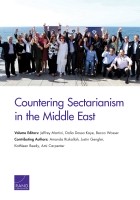| 来源类型 | Research Reports
|
| 规范类型 | 报告
|
| DOI | https://doi.org/10.7249/RR2799
|
| ISBN | 9781977401915
|
| 来源ID | RR-2799-HLF
|
| Countering Sectarianism in the Middle East |
| Jeffrey Martini; Dalia Dassa Kaye; Becca Wasser; Amanda Rizkallah; Justin Gengler; Kathleen Reedy; Ami Carpenter
|
| 发表日期 | 2019
|
| 出版年 | 2019
|
| 页码 | 154
|
| 语种 | 英语
|
| 结论 |
Geography matters- Border management was critical in several cases, determining whether certain communities became more vulnerable to sectarian actors.
- Although borders cannot always prevent sectarian mobilization, physical borders still matter in local settings. This is particularly the case in active war zones, where the ability of sectarian militia groups to easily traverse borders can fuel conflicts that otherwise might not turn violent.
Political elites foster and impede sectarianism- Political elites with patronage systems, particularly from external sources, tended to foster sectarianism and stymie cross-sectarian cooperation. When elites lose legitimacy, however, opportunities can emerge for leaders with nonsectarian agendas.
Civil-society development is critical- Capitalizing on opportunity is difficult if there are no alternative political leaders or movements to seize the moment with nonsectarian agendas. This requires some opening of political space for movements to form around issues that transcend sectarian identities (e.g., economic development, education reform).
Cross-sectarian interaction can be a buffer- Cross-sectarian interaction can boost resilience even in the face of sectarian-driven armed conflict. The stronger the level of trust and social connection across sectarian lines, the better equipped communities are to avoid sectarianism when conflict emerges.
- Conversely, when communities are built to segregate citizens along sectarian lines, the prospects for division and conflict increase.
Smaller socioeconomic gaps improve resistance to sectarianism- The narrower the socioeconomic gaps between Sunni and Shi'a residents, the less likely sectarian grievances and violence are to emerge.
- In neighborhoods where economic grievances and discrimination are greater, communities are more vulnerable to sectarian violence.
|
| 摘要 |
- Programs that focus on physical infrastructure, capacity-building of partners' border security forces, and leveraging of technology (e.g., biometrics) can support improved border control.
- Preventing sectarian conflict is a common incentive among external powers, even if those powers are at odds on broader policy goals.
- The international community can use financial leverage to crack down on state funding to groups designated as foreign terrorist organizations.
- Opening up space for greater cross-sectarian cooperation at the community level would create a peaceful channel for expressing grievances and discussing policy challenges that cut across sectarian agendas.
- Cultivating leaders who support domestic reform programs aimed to benefit the broader public — not just a particular group or tribe — is critical to reduce sectarianism and solve day-to-day challenges.
- The international community can bolster incentives for inclusive politics by praising leaders who prioritize public services and refrain from engaging in identity politics.
- Urban areas designed to integrate different sectors of society and increase economic opportunities are more likely to remain stable and peaceful when societal tensions increase.
- Global trends in urban renewal can provide new opportunities to improve infrastructure and create more public spaces to enhance economic development and intercommunal mixing.
- More support for local media could increase coverage of technocratic municipal issues that transcend sectarian difference, such as water challenges, trash collection, youth unemployment, and education gaps.
|
| 主题 | Bahrain
; Community Resilience
; Iraq
; Lebanon
; Peacekeeping and Stability Operations
; Syria
; Terrorist Organizations
|
| URL | https://www.rand.org/pubs/research_reports/RR2799.html
|
| 来源智库 | RAND Corporation (United States)
|
| 引用统计 |
|
| 资源类型 | 智库出版物
|
| 条目标识符 | http://119.78.100.153/handle/2XGU8XDN/108967
|
推荐引用方式
GB/T 7714 |
Jeffrey Martini,Dalia Dassa Kaye,Becca Wasser,et al. Countering Sectarianism in the Middle East. 2019.
|
|
文件名:
|
x1547231141461.jpg
|
|
格式:
|
JPEG
|

|
文件名:
|
RAND_RR2799.pdf
|
|
格式:
|
Adobe PDF
|
除非特别说明,本系统中所有内容都受版权保护,并保留所有权利。